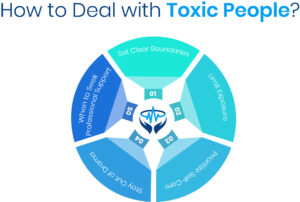Toxic behavior is much more than a series of occasional disagreements or bad moods. It is the regular habit of harmful actions, words, and attitudes that are hurting other people, both emotionally and psychologically, and even physically. Such behavior causes exhaustion of your energy, decreases your self-worth, and may affect all aspects of your life when you fail to deal with them at an early age. You may come across it in marriage, friendship, at our workplaces, or in love relationships. Left unchecked, toxic behavior doesn’t just create stress—it seeps into work, family, and even your sense of self.
Here, we will have an in-depth discussion of what toxic behavior is, its nature, warning signs, and practical instances. You will also get to know what the various categories of toxic people are, how to get along with them, and why it is important to avoid them where possible for your psychological well-being.
What is Toxic Behavior?
The toxic behavior is characterized as actions, words, and character traits that establish an unfavorable environment for other persons, which is mainly harmful. It is usually very insecure, grounded in the desire to be in control, an unresolved trauma, or jealousy. Toxic behavior can lead one to critique, manipulate, or control other people so that they feel powerful or secure.
Slimy behavior is subtle and obvious. An example of this is when sarcasm or back-handed compliments are made in such a way that they cut you down without necessarily being aggressive. Others would be more overt in their approach by criticizing others, humiliating them in front of other people, or even physically abusing them.
A toxic person may not be in a position to understand the impact that their actions have on other people. However, whether they know it or not, their behaviors damage their relationship, decrease the amount of trust, and cause emotional stress.
Characteristics of a Toxic Person
A toxic person tends to exhibit the same negative characteristics in various aspects of their life. It is not that they act that way simply toward a single person, but through this action, coworkers, family, friends, and partners also become victims. Being able to identify these features enables you to notice toxicity before it can do any additional harm.
Typical features are:
- They are not ready to apologize honestly, even when they are wrong.
- They always place their interests over and above all others.
- They fabricate or distort information to dominate circumstances.
- They violate individual and emotional space.
- They are manipulative of others.
These traits are exhausting to put up with, and ultimately, they may drain you psychologically. Whenever you observe these kinds of traits, you will know when to confront and when to avoid the person.
Toxic Personality Traits
The Toxic personality traits may be arrogance, dishonesty, selfishness, hostility, and lack of empathy. Individuals possessing such characteristics could be happy to cause conflict, belittle other people, or be in a constant attempt to win a dispute. In most cases, they are not ready to accept any of their mistakes, but they end up blaming other people.
As an example, a toxic person may often rebuke your decisions and deny the possibility of feedback on their behavior. They tend to feel the desire to control a conversation, to conquer the group decision, or to belittle other group members so that they can boost their self-esteem. These traits render it difficult to build and maintain healthy relationships with such individuals since they are enacted in different spheres of life.
Common Traits and Signs of Toxic Behavior
You can save yourself a lot of stress by catching the signs of toxic behavior. These symptoms often recur and are the same. Common indicators include:
- They twist facts, play mind games, or guilt-trip you to manipulate you.
- They do not experience what you experience and how difficult it is.
- They do not take blame; they blame.
- Shifting blame to someone else as much as possible.
When such signs persist frequently, it is solid evidence that you are facing toxic behavior and not random humanness.
Warning Signs of a Toxic Person
Bad days can happen to everyone, but a toxic person exhibits unhealthy tendencies. They often:
- Jealous of the success of others and attempt to minimize it.
- Act like competition instead of partnering.
- Take pleasure in others not succeeding or performing.
- Causing arguments to build up tension.
- Live off anarchy and theatrics to keep order.
These individuals rarely contribute to solutions. Instead, they focus on fueling problems and keeping emotional tension high.
How to Identify Toxic Behavior?
You can train yourself to be aware of how you feel after encountering someone to practice identifying toxic behavior. You need to raise a red flag when you are prone to walking away at the culmination of the interaction, being stressed, anxious, guilty, or exhausted.
Ask yourself: Do they invade my privacy, ignore my feelings, or impose their will on my views? The next are the questions that can help you understand whether you possess a toxic behavior or usual disagreements.
Patterns are then easier to follow with a mental and or written record of interactions throughout time. When the habit resists such open, honest conversation, the person will probably possess a toxic personality. To learn more about toxic behavior and its effects, click here , Signs of Toxic Behavior You Should Never Ignore
Toxic Behavior Examples
Here are some toxic behavior examples you might recognize:
- Causing negative publicity about a person.
- Silent punishment, rather than correcting the problem.
- The control of what one wears, says, and does.
- Cutting in and not listening to others all the time.
- Humbling another person in front of people.
Types of Toxic People
1. The Narcissist
The narcissist is always interested in admiration and prioritizes their needs over those of others. They are not always empathetic, and therefore, others feel unimportant or unseen. Their presence will suck out your self-esteem and self-confidence.
2. The Critic
The critic never thinks you have done well, however hard you may have tried. They are not supportive, but instead they are downing you. In the long term, they may decrease your self-esteem.
3. The Victim
The victim does not accept responsibility and constantly blames other people instead of accepting it. They live on sympathy and demand to be rescued at all times. The helplessness they experience may be emotionally draining to the people who are close to them.
4. The Controller
The controller must overpower circumstances and individuals to be safe. They do not pay much attention to how you feel and make decisions on your behalf. This tendency may make you feel enclosed and helpless.
5. The Drama Magnet
The theater kid turns everything into a mess and thrives off of gossip, crises, and conflicts. They blow things out of proportion to involve people in their issues. This is because it is usually stressful and exhausting being with them.
Toxic Behavior in Relationships
Toxic behavior in relationships is particularly harmful due to the emotional closeness. It can include:
- Constant envy and distrust.
- Disregard, or breaking of personal boundaries.
- Trying to intimidate a partner into doing something.
- Putting others down in an offensive way when disagreeing.
- Removing the partner of friends and family.
Healthy relationships require trust, respect, and open communication. Toxic behavior destroys these foundations and leaves partners feeling trapped or emotionally exhausted.
Signs of a Toxic Person in a Relationship
When in a relationship with a toxic person, you may observe that the person:
- Put your feelings or worries aside.
- Criticize you in the pretext of helping.
- Mistrust you, though you are honest.
- Attempt to manage daily operations and associations.
When you notice these signs again and again, it is time to handle the problem and quit the relationship to preserve your health.

1. Set Clear Boundaries
Be clear on what is and what is not acceptable and apply it all the time. Boundaries will serve to keep your emotional health intact and ensure that toxic persons do not cross boundaries. Keep in mind that it is not wrong to say no and not feel guilty.
2. Limit Exposure
Limit your time and energy on the toxic individuals, particularly when it has become a habit for them to drain you. This can include avoiding unnecessary contacts and long and futile discussions. Their mind must be locked to create peace.
3. Stay Out of Drama
Deny gossiping, fighting, or manipulation. Toxic people love to make a meal out of conflict, and in their quest not to fall prey to the situation, they are non-confrontational, relaxed, and solution-focused.
4. Prioritize Self-Care
Do something that restores your emotional and physical health. This may be exercise, hobbies, meditation, or some time to relax. Self-care makes you harder to attack by the poisonous elements.
5. When to Seek Professional Support
Talk to your close friends, relatives, or a health care professional who might provide you with guidance and a background. The ability to share your experiences with other people will assist in managing your emotions and stop feeling so alone.
Final Thoughts
Toxic behavior may profoundly impact your emotional, mental, and even physical health. Being aware of it can equip you to control your surroundings and make improved decisions to support your well-being.
You cannot change, but can only modify the way you act in response to the behavior of another person. Boundaries, contact minimization, and self-care allow you to avoid the unneeded stress and damage.
At MAVA Behavioral Health, we know how a toxic relationship can endure in all aspects of your mental health. Our team is offering specialist assessment and care due to the medicine management, including the personal resources to deal with the emotional strain burden.









